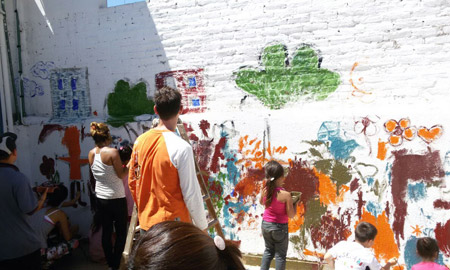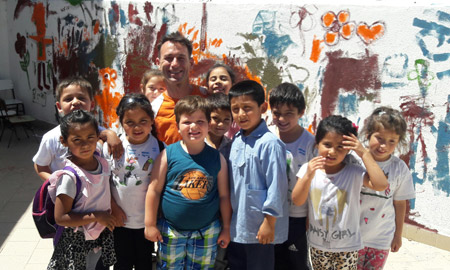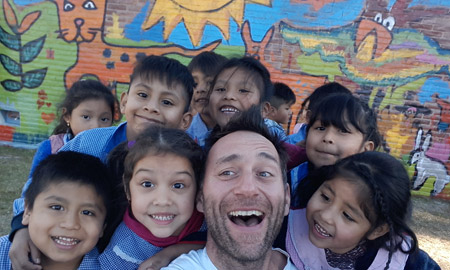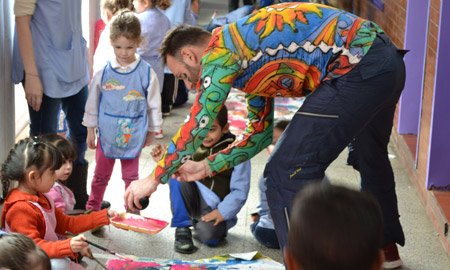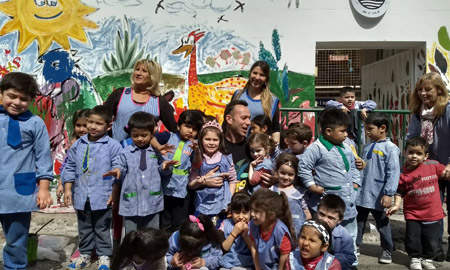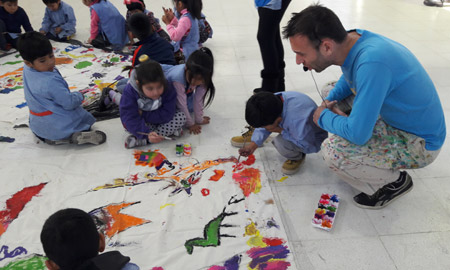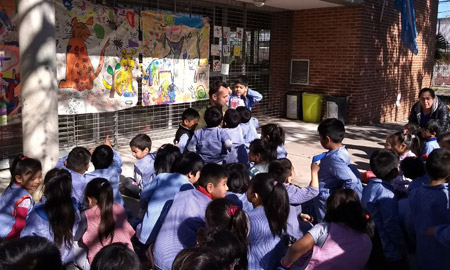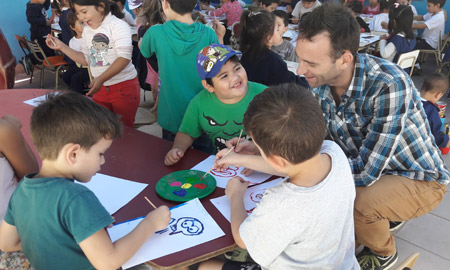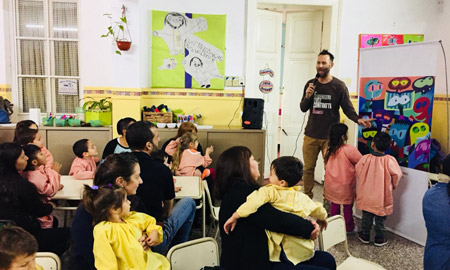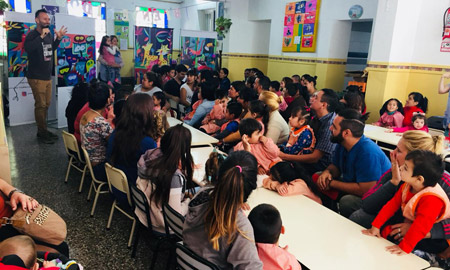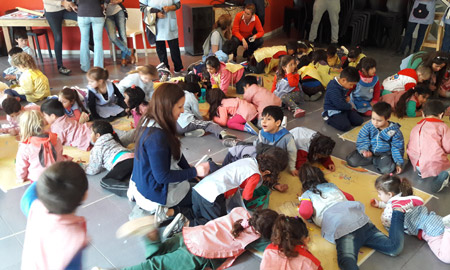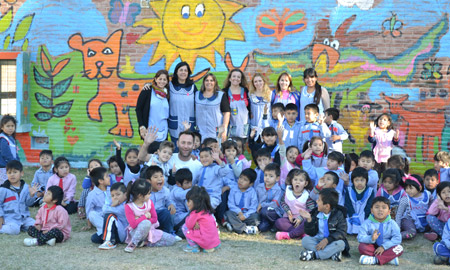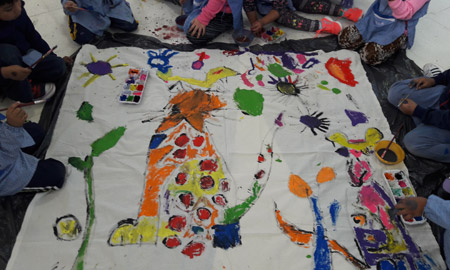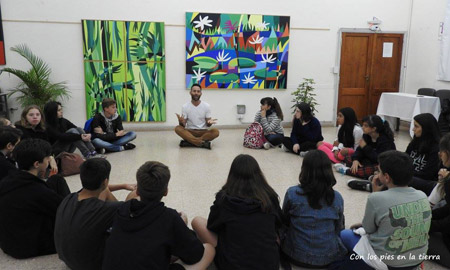A tool to bring Environmental Education to the educational community
Would you like us to bring Proyecto Bio to your school?
Museums, environmental, cultural and government spaces are ideal places to carry out the BIO Project environmental educational proposal to any city or region. This tool was created to develop environmental education for the entire educational community.
Likewise, the art and environmental education workshops reach institutions, kindergartens and schools through a detailed and organized program, achieving direct interaction between the children and the artist. Students learn, share, express themselves and have fun freely in each exchange, thus awakening a common interest in art, the environment, science, education and culture.
By interacting with them, the artist manages to consolidate bridges, stimulating imagination, integration, resilience and group teamwork: “The concept of camaraderie is very much reflected.”
MODALITY
The environmental workshops contain 5 modalities, the ideal is that each group of students and teachers carry out the 5 workshops of the program because they were specifically designed. But they can choose for example: workshops 1,2,4 and 5; 1,3,4 and 5; 1,2,3 and 5; 1,2 and 5 or 1,4 and 5. But workshop 1 is always a priority and essential to connect and complement the other workshops.
Each institution will analyze the possibilities and combinations, being able to make queries and questions that you previously needed. Once the workshops and the days on which they will be held have been agreed upon, the agenda will be coordinated and a daily activity sheet will be organized to plan the sessions, since the workshops are closely related to each other.
The students for each workshop module that participate, will develop creative skills, stimulate their confidence, their individual and collective cognitive abilities, as well as the meeting with their teachers. All of this, which is purely experiential, will add up in each encounter with the artist.
The program is adapted to children and young students of all ages: students of first, second and third childhood. They will also be integrated with their teachers and professors, who must participate and accompany them in all the sessions.
Up to a total of 4 daily shifts of 2 hours will be established for groups of up to 80 children (which would be approximately the equivalent of two or three grades) until the action objective agreed with the institution is reached. This criterion is the same for workshops 1,2,3 and 5. Workshop 4 generally requires a full day. For example, if the school participates in the morning shift and afternoon shift, that day the students will be sharing slogans.
The program has workshop 5, which is a specific environmental workshop for teacher training to strengthen emotions and personal interrelationships among adults. This workshop is essential to establish new goals of coexistence and for each institution to renew its ties and its pedagogical values through the encounter with art.
The artist and his work with the students.
a) The individual experience, the personal capacities and the creative state of the child are connected. The artist will bring 4 to 5 banners with his environmental works. These will be used to communicate art and be able to awaken in the students the teaching and what they provide.
b) Basic trust is strengthened, environmental content and values are taught from the word and art is an experiential way of expression.
c) The students will then carry out individual practical work that stimulates that confidence and their imagination.
Workshop 1 integrates and recreates a group talk through works of art with environmental content in positive emotions to renew the children’s own talents by experiencing and empathizing with the artist.
Group integration – Art on canvas
a) Self-esteem and group work are enhanced by exchanging environmental content such as autochthonous and native species of the place, endangered species, exotic animals, etc.
b) The children students, based on their diversity, connect in designing works of art on canvas (murals on canvas) that will later remain in school as practical teamwork.
c) The children will unite in teams of different ages to make the fabric works, strengthening their communication and creation skills.
The second stage of workshop 2 will be carried out for the same students of workshop 1, since they will be familiar with the artist and will be able to respond very well with the slogan of teamwork to paint on canvas, environmental art freely based on knowledge provided.
Workshop 2 recreates self-esteem and group work, how to face a real design exercise on a real canvas of works in scale just like when the artist presents his own work. In turn, the children of the different grades will be randomly mixed to meet the assigned instructions and goals. This exercise disarms stereotypes and generates empathy. For each canvas of 150 x 150 cm, up to 8 students will work. Previously they will have the slogans and then everyone will be surprised with unique and ingenious works. These interventions will be their own, they will be distributed and will remain in the classrooms of the schools.
BIO Project Tales
a) The children’s and environmental stories of the BIO Project will be read or listened to off-screen (they are different stories depending on the age of the child) to enhance the imagination, fantasies with stories that will make them have fun and connect with their emotions, discussing them until they are understood.
b) The students will then carry out an individual practical work that stimulates that imagination.
c) The works will remain in the school.
The third stage of workshop 3 will also be carried out with the same students depending on the pre-established groups and ages. Here the basic spiritual and individual confidence of each student is renewed. A debate will be created in a circle of opinions and ideas and all will be heard to draw conclusions.
Then the students and teachers will carry out their practical work based on the new imagination generated by the contents of the environmental stories.
Community Art Murals with Families
a) This workshop is the most complete of all the meetings because the children will capture all the knowledge acquired in the previous workshops on a wall in the school or in the city and that happy result will be their mark.
b) Together with the artist and their families, the students will create an environmental art mural on one of the walls of the patio of their school. This act will allow to reinforce the bond in values, of permanence and love to their school.
c) In general, a mural on a wall requires a full day of work.
Teacher/parent training.
In this meeting, the artist will communicate all his knowledge in terms of Emotional and Environmental Education for parents and teachers who participate. The workshop is ideal to enhance the teacher-parent relationship and good treatment with their students and children.
This training greatly favors human relations between adults and with the other, especially in how we act and how we establish good communication. The artist will talk about issues that make coexistence, empathy and resilience itself.
REQUEST WORKSHOP
For more details about the environmental art workshops and taking them to your school or holding an expo in your city, I invite you to contact me by clicking on the Whatsapp button, by email to [email protected] or by completing the following form:

